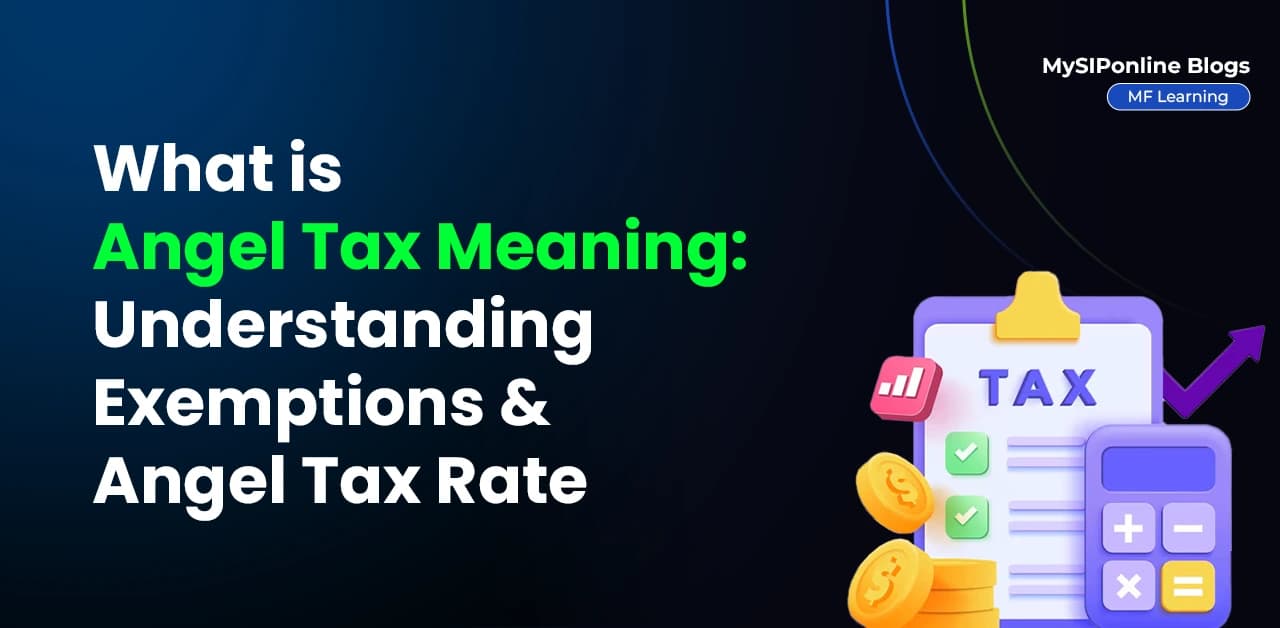Table of Contents
Did you know what is angel tax was previously known as in India? Well, formally it was known as Section 56 (2)(VII) (B) of the Income Tax Act 1961.
The angel tax India was introduced in the 2012 Union Budget by the UPA government and was done so to detect money-laundering practices and catch bogus start-ups. Why?
The answer is simple: Start-ups need money to grow and one way or the other, they need to raise funds from the market.
That's where the role of angel investors comes in. But, "What if you raise money at a higher investment valuation?" "Will the angel tax be applicable to you?"
In this blog, you will get everything there is to know about the angel tax meaning, its tax rate in India and the angel tax exemption as well.
Keep scrolling and learn more.
What is Angel Tax in India?
To understand the angel tax meaning in simple words, it is an income tax payable on the Mutual Funds raised by unlisted companies from angel investors.
Now, you see, many unlisted companies in the market have strong profitability and promising growth ideologies, which makes them attractive investment options to angel investors (type of investors investing in early start-ups in exchange for equity or convertible debt) who are willing to buy ownership at higher valuations.
However, when these companies raise money at a value higher than their fair market price, the excess sum is referred to as "Income from Other Sources" and is subject to angel tax India.
(Note: Angel tax has been abolished from the FY 2025-26 as announced in the Union Budget 2024 by the Finance Minister, Mrs. Nirmala Sitharaman of India.)
Angel Tax Rate in India
The angel tax India is levied at a 30% interest rate and an additional 3% cess is applicable as per section 56 (2) (vii) (b) of the Income Tax Act 1961. Thereby, the combined effective rate of angel tax is 30.9%, which is very important to balance your accounts and plan your taxes.
Also Read: What’s new for taxpayers in the Union Budget 2025-26?
What is the Exemption of Angel Tax India?
Previously, the angel tax was levied under Section 56(2)(vii)(b) on the entire amount. However, the government has come up with several conditions, and meeting those will help investors get a tax exemptions for startups.
These conditions are as follows:
- The start-up must be recognised by the Department of Promotion of Industry and Internal Trade (DPIIT).
- The start-up must not invest in jewellery, land, buildings, capital investment in any other organisation, any transportation means costing more than Rs 10 lakh or loan advancements.
- A certified merchant banker must determine the valuation and its fair market value.
- The start-up must have a total paid-up capital of less than or equivalent to Rs.25 crore.
Union Budget 2025-26 Explained: Fiscal Strategy, Sectoral Growth & Market Analysis
How to Apply the Angel Tax India?
The applicability of the angel tax on investments is calculated on the tax difference between the face value of the shares issued and their actual value at the applicable rate.
The tax authorities also charge angel tax in India on the premium earned by the start-ups. Investments over & above the fair market value are taxed at 30.9%.
To make things clearer, let's understand how the angel tax in India is applicable with the help of an example in the next heading.
Angel Tax Example: Learning Made Easy
Let's say a pizza start-up receives startup funding of Rs.20 crores. However, the company's fair value is Rs.12 crore only.
Now, the remaining Rs.8 crore is the premium investors are willing to pay for the stake in the pizza start-up.
Hence, the angel tax will be applicable to this Rs.8 crore figure, which is the premium amount instead of the entire amount of funding received by the person.
Final Thoughts
To sum up, the angel tax on investments has been a big problem for start-ups in India, as it taxes the extra money raised beyond a company’s fair value. But, the angel tax abolition 2025-26 financial year is a positive change. This will make it easier for start-ups to get startup funding in India.
Additionally, if a start-up is registered under the DPIIT startup recognition (Department of Promotion of Industry and Internal Trade), it is already exempt from this tax. Overall, this change is expected to help India’s start-up scene grow and thrive.
Frequently Asked Questions on Angel Tax India
-
Is angel tax abolished in India?
The angel tax was abolished in India from 1st April 2025 as announced in the Finance Bill by the Finance Minister in the 2024 Union Budget speech.
-
What is the angel tax incentive?
The angel tax rate in India is levied at 30.9% on investments received by a start-up greater than its fair market value as regulated by the Income Tax Department.
-
Who will pay angel tax?
The companies receiving angel funds are liable to pay an angel tax. Moreover, the angel investors pay this tax when they invest a hefty sum in the start-ups to obtain equity.
-
Who is the richest angel investor in investor in India?
Mr Kunal Shah is amongst the richest and active angel investor in India,, known for numerous investments in start-ups like CRED, FreeCharge, Unacademy, Slice and many more.











